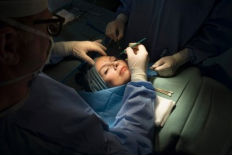Safety In Cosmetic Surgery
J. G. Estoya

There is a general acceptance of cosmetic surgery now compared to the past. I believe cosmetic surgery is here to stay despite the downturn of the recent economic recession, or despite the advent of a plethora of non-invasive procedures that attempt to mimic the results of surgery.
There is a prevailing impression that cosmetic surgery is only superficial or minor. I do not know who is guilty of trivializing the procedure – the practitioner or the patient. Perhaps the advancement in anesthesia for a good control of post-operative pain has made the operative results seem casual.
Back to Articles
Or maybe, it is the significant number of out-patient or ambulatory procedures that you even find in Malls. Plastic surgery always attempts to avoid the tell-tale-signs of the procedure, hence, patients may get the impression that it is minor. For instance, nose job scars are kept within the nostrils; liposuction scars are concealed within the bellybutton. However, underneath those small and hidden incisions are large wounds that accommodate the purpose of surgery. The same science of wound healing applies to cosmetic surgery as it applies to the other major forms of operation. Without a doubt, there are inherent risks and potential complications in all forms of surgery. The following may help you minimize these risks as you scout for a doctor and clinic for your contemplated procedure:
Know your doctor. There are many cosmetic surgeries done by non-qualified doctors (even non- doctors!). Check his credentials. Try to know if he finished a formal residency training in Plastic Surgery.
Do not scout for the least expensive or the cheapest doctor. Give importance on his academic and training background. Do not be swayed by his marketing hype. Ask your friends and the previous patients about his quality of care.
Beware of doctors who make astonishing promises, and who do not discuss risks and complications.
Be wary about doctors who “sell” a procedure for you. Do not allow any doctor to force you into any procedure you do not want.
Avoid controversial drugs, prosthetics and procedures that have no long term studies and have not been proven to be safe. It is noteworthy to know if it is BFAD, FDA (or the like) approved.
Be skeptical about drugs or prosthetics that are the less expensive or the so called cheaper versions. Take the quality of the drug or material into consideration more than its cost. If undergoing breast augmentation, ask about the maker of the breast implants.
Do not allow yourself to be injected or undergo any medical/surgical procedure in a beauty parlor or a similar facility.
Make sure that the cosmetic center or clinic-operating-room is equipped and properly certified. Needless to say, there are cosmetic operations that are safer when performed in the hospital. Inquire about the appropriateness of the operative setting.
Be wary about clinics that are like one-stop-shops, where they do not give attention to your medical history and medical problems.
Avoid liquid silicon (often called “collagen”) to be injected on your nose, breasts, hips or any part of your body. The use of injected silicon has been abandoned since the 70’s because of its untoward results.
Non-invasive procedures may not be the most optimal option for your cosmetic problem. Extending the indications of these non-invasive procedures may not only prove to be more costly but also riskier for complications.